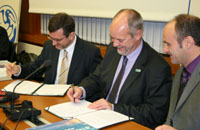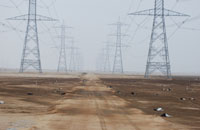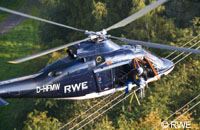RWE Rhein-Ruhr Netzservice and the African-Eurasian Migratory Waterbird Agreement sign Cooperation Agreement at the 37th Meeting of the CMS Standing Committee

Bonn, 23 November 2010 -
The African-Eurasian Migratory Waterbird Agreement and
RWE Rhein-Ruhr Netzservice have signed a historic Cooperation
Agreement to support an independent review and the development
of guidelines for mitigating and avoiding the conflict
between migratory birds and electricity power grids in
the African-Eurasian region.
“Many species of migratory birds, especially large
species, fall victim to transmission lines, conductors
or poles of electricity power grids. For some populations,
this may pose a critical threat and lead to significant
declines.” said Elizabeth Maruma Mrema, Executive
Secretary of the Convention on Migratory Species.
“The international review and the resulting guidelines
will be an important first step towards reducing this threat
and will help countries address the problem in the context
of CMS, the African-Eurasian Migratory Waterbird Agreement
and the Raptor MoU” underlined Mrema.
 Although a number of countries have already passed specific
Although a number of countries have already passed specific
legislation on protecting birds from fatalities on the
electricity power grid, the magnitude of the bird-power
grid conflict is still poorly understood on the larger
scale of the African-Eurasian region.
“We hope that the review and guidelines will give
us a better understanding of the existing bird-power grid
conflict in the African-Eurasian region and will provide
a practical overview of the various solutions and guidance
available on mitigating and avoiding the electrocution
and collision of migratory birds in the AEWA region and
beyond.” said Bert Lenten, the Executive Secretary
of AEWA and Acting Deputy Executive Secretary of CMS.
The international review is being made possible through
the support from RWE Rhein-Ruhr Netzservice, a daughter
company of RWE, one of the largest energy companies in
Europe. The company has specialized in fitting preventive “bird-reflectors” to
high-voltage powerlines using a helicopter as a measure
to try to reduce the collision of large birds with the
powerlines.
 "As RWE Rhein-Ruhr Netzservice we are pleased to
"As RWE Rhein-Ruhr Netzservice we are pleased to
be able to support the UNEP Convention on Migratory Species
and the African-Eurasian Migratory Waterbird Agreement
in carrying out this important study on bird protection.
We are certain that our method of fitting bird protection
markings to overhead powerlines from a helicopter can contribute
to avoiding the conflict between migratory birds and electricity
power grids", says Dr. Peter Birkner, Managing Director
of RWE Rhein-Ruhr Netzservice GmbH.
The signing ceremony took place today in the margins of
the 37th Meeting of the Standing Committee to the UNEP
Convention on the Conservation of Migratory Species of
Wild Animals, currently being held in Bonn, Germany from
23-24 November 2010.
Last updated on 16 June 2014


